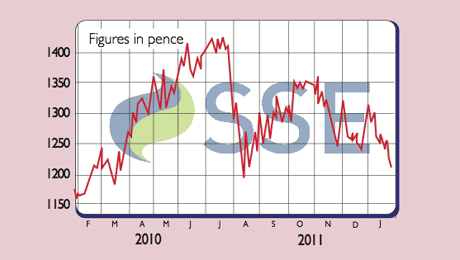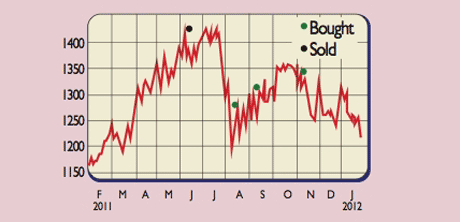Shares in focus: Can SSE keep growing dividends?
SSE has a fantastic record of growing dividends. But are the energy supplier's glory days now over? Phil Oakley investigates.
Get the latest financial news, insights and expert analysis from our award-winning MoneyWeek team, to help you understand what really matters when it comes to your finances.
You are now subscribed
Your newsletter sign-up was successful
Want to add more newsletters?

Twice daily
MoneyWeek
Get the latest financial news, insights and expert analysis from our award-winning MoneyWeek team, to help you understand what really matters when it comes to your finances.

Four times a week
Look After My Bills
Sign up to our free money-saving newsletter, filled with the latest news and expert advice to help you find the best tips and deals for managing your bills. Start saving today!
What is it?
SSE is one of Britain's largest gas and electricity companies. It owns more than 11,000 megawatts of electricity capacity, generated from gas, coal, hydro, wind and biomass. It supplies gas and electricity to more thanten million customers in Britain and Ireland, along with other services, such as boiler and central heating maintenance, and telecoms and broadband.
SSE owns the regulated electricity transmission and distribution network for the north of Scotland, electricity distribution in southern England, and 50% of the gas distribution networks in Scotland and southern England. It also operates two gas storage facilities in East Yorkshire and an 11,100km telecoms network.
What is its history?
Formed in 1998 by the merger of Scottish Hydro Electricity and Southern Electric, SSE has been one of Britain's most successful utility companies, more than doubling its share of the British energy supply market in the last decade. In that time, it has also been one of the best dividend payers in the FTSE 100, growing its payments by an average of 9.6% a year.
MoneyWeek
Subscribe to MoneyWeek today and get your first six magazine issues absolutely FREE

Sign up to Money Morning
Don't miss the latest investment and personal finances news, market analysis, plus money-saving tips with our free twice-daily newsletter
Don't miss the latest investment and personal finances news, market analysis, plus money-saving tips with our free twice-daily newsletter
Investments such as the 2004 purchases of the Fiddlers Ferry and Ferrybridge coal-fired power stations, and its investment in gas networks in 2006, have paid off, with earnings from the low-risk, regulated network assets balancing out the more volatile power-generation business. In 2008, SSE also began making significant investments in wind power, with the acquisition of Airtricity.
Who runs it?
Ian Marchant, formerly finance director, has been chief executive since 2002. He was paid £1.2m in 2010/2011. Lord Smith of Kelvin (who also chairs oil services group Weir) has been chairman since 2005. Gregor Alexander is finance director.
How's trading?
Results for the six months to September 2011 saw adjusted pre-tax profit fall by 25% to £287.4m, while earnings per share fell by 24% to 25.1p. The interim dividend was raised by 7.1% to 24p per share. While most of SSE's businesses performed well, its energy supply business saw profits fall by 71%, as the company was unable to pass higher wholesale gas costs on to customers. Lower demand and margins for electricity also hit profits.
What's the outlook? SSE still expects a very small rise in full-year profits, which might be ambitious, given the 25% decline seen in its first half. It also says it is on target to grow dividends by 2% above inflation until 2013. Beyond that, SSE should continue to earn reasonable returns from its regulated network assets, but its big investments in renewable energy are far less secure: these are expensive and power prices need to stay high to make them pay. If the British economy stays in the mire, then SSE's returns could disappoint, and perhaps threaten its ability to keep growing dividends.
The analysts
Of the 24 analysts surveyed by Bloomberg, nine say "Buy", 12 "Hold" and three "Sell". The average price target is 1,369p 13% above the current share price. Most bullish is Exane with a 1,630p price target, whereas Goldman Sachs is most bearish with a 1,225p target.
The numbers

Stockmarket code: SSE
Share price: 1,212p
Market cap: £11.4bn
Net assets (Sept 2011): £4.6bn
Net debt (Sept 2011): £6.4bn
P/e (current year estimate): 10.9 times
Yield (prospective): 6.6%
Our view
SSE's big bet on renewable energy looks increasingly risky, given the weak state of the British economy. We believe that the days of stellar dividend growth may now be over. It's time to sell.
Directors' dealings

Non-executive directors Jeremy Beeton and Katie Bickerstaffe both purchased 2,000 shares last autumn. Chief executive Ian Marchant and finance director Gregor Alexander respectively sold 5,970 and 3,371 shares in June last year. Recent share activity can be seen in the chart on the left, with the main directors' shareholdings shown below.
Directorand sharesheld
I Marchant: 231,978
G Alexander: 93,883
A Phillips-Davies: 104,031
R Smith: 22,600
Get the latest financial news, insights and expert analysis from our award-winning MoneyWeek team, to help you understand what really matters when it comes to your finances.
Phil spent 13 years as an investment analyst for both stockbroking and fund management companies.
-
 Should you buy an active ETF?
Should you buy an active ETF?ETFs are often mischaracterised as passive products, but they can be a convenient way to add active management to your portfolio
-
 Power up your pension before 5 April – easy ways to save before the tax year end
Power up your pension before 5 April – easy ways to save before the tax year endWith the end of the tax year looming, pension savers currently have a window to review and maximise what’s going into their retirement funds – we look at how